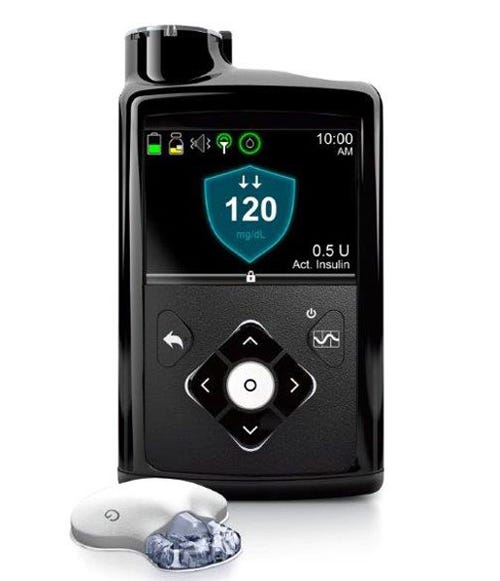Medtronic Hit by High Demand for Diabetes Devices
August 23, 2017
A victim of its own success, the medical device conglomerate is racing to add production capacity for the sensors used as part of its insulin pump systems.
Marie Thibault
Demand for Medtronic's diabetes devices is soaring. So why has the popularity of its continuous glucose monitoring sensors, used in the insulin pump systems, and its MiniMed 670G hybrid closed-loop system for insulin delivery actually slackened sales?
The short-term sales slowdown can be partially blamed on capacity constraints around its sensor production line. As Medtronic executives explained on the company's earnings call for the first quarter of its 2018 fiscal year, with demand outpacing sensor supply, current customer needs take precedence over new customer system sales.
"The increased demand is largely for the new highly accurate generation of sensors, enhanced Enlite in international markets and the Guardian Sensor 3 in the U.S., and has temporarily outstripped our production capacity," Omar Ishrak, Medtronic chairman and CEO, said, according to a Seeking Alpha transcript of the earnings call. "We accelerated plans to increase sensor production capacity last year. But these lines are not expected to be ready for commercial production until our fourth quarter at which time we expect to have the capacity needed to meet the rapidly growing sensor demand. Until then we have to prioritize sensor fulfillment towards our installed base of customers. In the short-term, this leaves less available for high revenue generating new patient system sales."
In addition, Medtronic's MiniMed 670G insulin pump system, the latest generation offering which operates as a hybrid closed-loop system for insulin delivery, is enjoying even stronger demand than expected. FDA approved the 670G system earlier than expected and months before the planned commercial launch, but the company gave patients the chance to buy the prior-generation MiniMed 630G system and exchange it for the 670G system at a lower fee once it became available. This Priority Access program was more popular than expected, Medtronic executives noted this week, which means a near-term hit to margins and sales.
|
Ishrak pointed out that 32,000 patients enrolled in the Priority Access program, many more than anticipated. "However, because we only recognized a small portion of deferred revenue when exchanging the pumps, the program currently affects both revenue and margins," he said. "We expect to complete fulfillment to our priority access customers later this fall."
Both Ishrak and Hooman Hakami, group president of Medtronic Diabetes, emphasized that the capacity constraint on sensor production is not related to manufacturing yield, sensor quality, or manufacturing problems. They explained that the outsized sensor demand simply requires more production lines, and the company needs FDA approval for some of the equipment used on the product line.
"We know the equipment. We know the process," Hakami said. "So bringing the equipment in, doing all of the qualifications, that's something we feel very comfortable with. Then there is obviously the variable of turning all of that over to the FDA and seeking their approval."
Expanded product capacity is expected by the company's fiscal fourth quarter.
Analysts seemed to take the news in stride. Mike Matson, analyst at Needham & Company, wrote in an August 23 research note, "While the Diabetes issue is disappointing, we view this as a 'high class problem' since it's being driven by stronger than expected demand, and we believe it can be resolved by simply expanding production (now underway)."
Ishrak said, "Towards the end of the fiscal year, we expect our diabetes group to be in a position to capitalize on its differentiated innovation in the marketplace with stronger revenue and profit growth not only from increasing sales of our leading insulin pump technology but also ongoing sensor annuity revenue."
Marie Thibault is the managing editor at MD+DI. Reach her at [email protected] and on Twitter @MedTechMarie.
[Image courtesy of MEDTRONIC PLC]
About the Author(s)
You May Also Like


.png?width=300&auto=webp&quality=80&disable=upscale)
